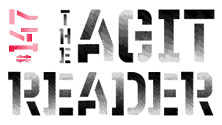
In Vogue Spirit
De Stijl
For proof that the kosmiche echoes of the Germanic progressive movement of the ’70s has become a ubiquitous force in modern music, look no further than how it has infiltrated Iowa City’s Wet Hair. That this system of space guitars, motorik rhythms and advanced explorations in electronic resonance are alive and present and well-represented in the heartland of America is not only indicative of the organic force of that music, but also of how malleable those forward-thinking ideas would become over time. For the most part, Wet Hair tend to take an approach to recording and composition similar to Brian Eno (who himself took to appropriating bands like Cluster and Neu! into his new designs). On Wet Hair’s third album, In Vogue Spirit, the trio is searching for humanness in their army of analog synths, letting the machines do most of the work, and instead of fretting over borders and structures, allowing oblique strategies to guide them along. If you’ve ever been exposed to Ryan Garbes’ former outfit, the tribal psych puddles of Raccoo-oo-oon, or previous Wet Hair releases, then you know it’s never really been about songs. But while that past has shown signs of brilliant color and foreign textures, they’ve never been this fully formed. By focusing on trying to be an amorphous, inexplicable enigma of a band, Wet Hair meandered on the fringe, too indistinct for indistinction’s sake. It was the incidental soundtrack to bong sessions and deep thinking. Now, with In Vogue Spirit, it sounds like the trio has taken a giant evolutionary step.
The most startling thing in this search for incongruity, shifting speeds, and the spontaneous analog error is that this isn’t just a synth album a la Emeralds or the endless sea of kosmiche followers who find divinity in Popol Vuh, Tangerine Dream or Stockhausen. “Echo Lady,” which leads off the album, is Garbes, Shawn Reed and Matt Fenner representing Wet Hair as a imaginary, hirsute jam band straight though a portal from ’74. The song slowly burns and crackles the same way as Wooden Shjips’ infinity grooves. The same feel tumbles through “Fade Til Morning,” a variation on Can were they in practice mode and unaware of the scruffy way the bass and drums are too high in the mix. And in this new system Wet Hair have developed, the strategy to bust through in this guise allows a freedom that hasn’t come before. Yet the album’s many highlights are strictly constructed on top of cloud-like layers of synth, organ, and whatever circuits they could find, as heard on the Another Green World-esque “Fame Hate” or the Kraftwerkian mambo of “Tarantula.” Wet Hair knows where to set the controls and when to let them fly. There’s nowhere on In Vogue Spirit where these two sides ever collide, and perhaps that’s for the betterment of Wet Hair’s process. The grand finale, “Cosmic Radio,” is multi-headed and would rather split into distinct parts—heavy psych rash, tempered jam, sparkling synth ascensions—than clash. In Vogue Spirit isn’t a perfect record, though there are moments of perfection, it’s more a perfect foil for any band tuned to the same psychedelic outré leanings who would dare put this much informed thought into the creation of the kosmiche.
Kevin J. Elliott
PRIMITIVE FUTURES
Skeletons, People
An Interview with the Feeling of Love
Tic Tac Totally Singles Round-Up
Silver Shampoo, Higher and Higher
The Alps, Easy Action
Ripe on the Vine
Mueran Humanos, Mueran Humanos
Introducing... Whatever Brains
Kleenex Girl Wonder, Secret Thinking
Providien, Followed By a Wraith
February Singles Round-Up
Mike Shiflet, Llanos
Ryan Jewell, Eschew Obfuscation/Espouse Elucidation
Introducing... Slug Guts
